When the World Shook (4)
By:
March 30, 2012
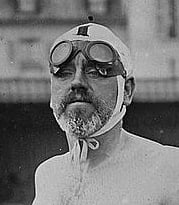
HILOBROW is pleased to present the fourth installment of our serialization of H. Rider Haggard’s When the World Shook. New installments will appear each Friday for 24 weeks.
Marooned on a South Sea island, Humphrey Arbuthnot and his friends awaken the last two members of an advanced race, who have spent 250,000 years in a state of suspended animation. Using astral projection, Lord Oro visits London and the battlefields of the Western Front; horrified by the degraded state of modern civilization, he activates chthonic technology capable of obliterating it. Will Oro’s beautiful daughter, Yva, who has fallen in love with Humphrey, stop him in time?
“If this is pulp fiction it’s high pulp: a Wagnerian opera of an adventure tale, a B-movie humanist apocalypse and chivalric romance,” says Lydia Millet in a blurb written for HiLoBooks. “When the World Shook has it all — English gentlemen of leisure, a devastating shipwreck, a volcanic tropical island inhabited by cannibals, an ancient princess risen from the grave, and if that weren’t enough a friendly, ongoing debate between a godless materialist and a devout Christian. H. Rider Haggard’s rich universe is both profoundly camp and deeply idealistic.”
Haggard’s only science fiction novel was first published in 1919. In September 2012, HiLoBooks will publish a beautiful new edition of When the World Shook, with an introduction by Atlantic Monthly contributing editor James Parker. NOW AVAILABLE FOR PRE-ORDERING!
SUBSCRIBE to HILOBROW’s serialized fiction via RSS.
LAST WEEK: “I shook my head, whereon as a result of further cogitation, Bastin submitted that the Unknown would be suitable. Bickley said that he thought this a foolish idea as everything worth knowing was already known, and what was the good of drinking to the rest? A toast to the Truth would be better. A notion came to me. ‘Let us combine them,’ I said, ‘and drink to the Unknown Truth.'”
ALL EXCERPTS: 1 | 2 | 3 | 4 | 5 | 6 | 7 | 8 | 9 | 10 | 11 | 12 | 13 | 14 | 15 | 16 | 17 | 18 | 19 | 20 | 21 | 22 | 23 | 24
I made my inquiries through a London agency which hired out yachts or sold them to the idle rich. As I expected, there were plenty to be had, at a price, but wealthy as I was, the figure asked of the buyer of any suitable craft, staggered me. In the end, however, I chartered one for six months certain and at so much per month for as long as I liked afterwards. The owners paid insurance and everything else on condition that they appointed the captain and first mate, also the engineer, for this yacht, which was named Star of the South, could steam at about ten knots as well as sail.

I know nothing about yachts, and therefore shall not attempt to describe her, further than to say that she was of five hundred and fifty tons burden, very well constructed, and smart to look at, as well she might be, seeing that a deceased millionaire from whose executors I hired her had spent a fortune in building and equipping her in the best possible style. In all, her crew consisted of thirty-two hands. A peculiarity of the vessel was that owing to some fancy of the late owner, the passenger accommodation, which was splendid, lay forward of the bridge, this with the ship’s store-rooms, refrigerating chamber, etc., being almost in the bows. It was owing to these arrangements, which were unusual, that the executors found it impossible to sell, and were therefore glad to accept such an offer as mine in order to save expenses. Perhaps they hoped that she might go to the bottom, being heavily insured. If so, the Fates did not disappoint them.
The captain, named Astley, was a jovial person who held every kind of certificate. He seemed so extraordinarily able at his business that personally I suspected him of having made mistakes in the course of his career, not unconnected with the worship of Bacchus. In this I believe I was right; otherwise a man of such attainments would have been commanding something bigger than a private yacht. The first mate, Jacobsen, was a melancholy Dane, a spiritualist who played the concertina, and seemed to be able to do without sleep. The crew were a mixed lot, good men for the most part and quite unobjectionable, more than half of them being Scandinavian. I think that is all I need say about the Star of the South.
The arrangement was that the Star of the South should proceed through the Straits of Gibraltar to Marseilles, where we would join her, and thence travel via the Suez Canal, to Australia and on to the South Seas, returning home as our fancy or convenience might dictate.
All the first part of the plan we carried out to the letter. Of the remainder I say nothing at present.
The Star of the South was amply provided with every kind of store. Among them were medicines and surgical instruments, selected by Bickley, and a case of Bibles and other religious works in sundry languages of the South Seas, selected by Bastin, whose bishop, when he understood the pious objects of his journey, had rather encouraged than hindered his departure on sick leave, and a large number of novels, books of reference, etc., laid in by myself. She duly sailed from the Thames and reached Marseilles after a safe and easy passage, where all three of us boarded her.
I forgot to add that she had another passenger, the little spaniel, Tommy. I had intended to leave him behind, but while I was packing up he followed me about with such evident understanding of my purpose that my heart was touched. When I entered the motor to drive to the station he escaped from the hands of the servant, whimpering, and took refuge on my knee. After this I felt that Destiny intended him to be our companion. Moreover, was he not linked with my dead past, and, had I but known it, with my living future also?
THE CYCLONE
We enjoyed our voyage exceedingly. In Egypt, a land I was glad to revisit, we only stopped a week while the Star of the South, which we rejoined at Suez, coaled and went through the Canal. This, however, gave us time to spend a few days in Cairo, visit the Pyramids and Sakkara which Bastin and Bickley had never seen before, and inspect the great Museum. The journey up the Nile was postponed until our return. It was a pleasant break and gave Bickley, a most omnivorous reader who was well acquainted with Egyptian history and theology, the opportunity of trying to prove to Bastin that Christianity was a mere development of the ancient Egyptian faith. The arguments that ensued may be imagined. It never seemed to occur to either of them that all faiths may be and indeed probably are progressive; in short, different rays of light thrown from the various facets of the same crystal, as in turn these are shone upon by the sun of Truth.
Our passage down the Red Sea was cool and agreeable. Thence we shaped our course for Ceylon. Here again we stopped a little while to run up to Kandy and to visit the ruined city of Anarajapura with its great Buddhist topes that once again gave rise to religious argument between my two friends. Leaving Ceylon we struck across the Indian Ocean for Perth in Western Australia.
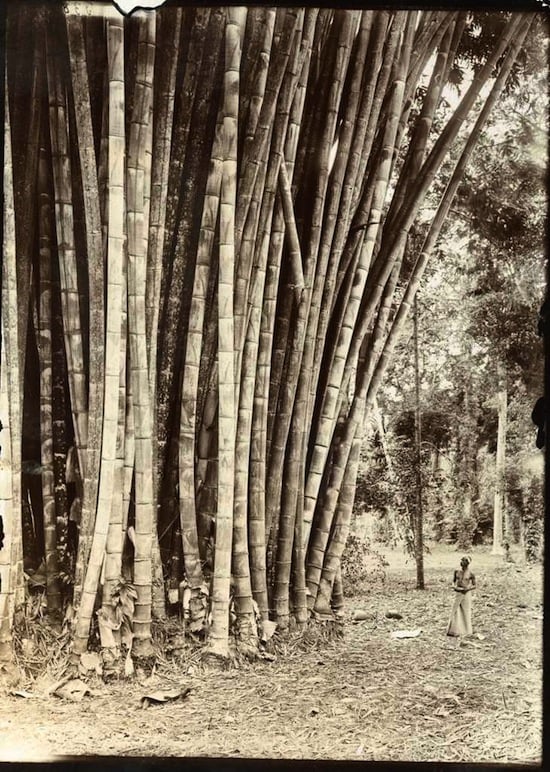
It was a long voyage, since to save our coal we made most of it under canvas. However, we were not dull as Captain Astley was a good companion, and even out of the melancholy Dane, Jacobsen, we had entertainment. He insisted on holding séances in the cabin, at which the usual phenomena occurred. The table twisted about, voices were heard and Jacobsen’s accordion wailed out tunes above our heads. These happenings drove Bickley to a kind of madness, for here were events which he could not explain. He was convinced that someone was playing tricks upon him, and devised the most elaborate snares to detect the rogue, entirely without result.
First he accused Jacobsen, who was very indignant, and then me, who laughed. In the end Jacobsen and I left the “circle” and the cabin, which was locked behind us; only Bastin and Bickley remaining there in the dark. Presently we heard sounds of altercation, and Bickley emerged looking very red in the face, followed by Bastin, who was saying:
“Can I help it if something pulled your nose and snatched off your eyeglasses, which anyhow are quite useless to you when there is no light? Again, is it possible for me, sitting on the other side of that table, to have placed the concertina on your head and made it play the National Anthem, a thing that I have not the slightest idea how to do?”
“Please do not try to explain,” snapped Bickley. “I am perfectly aware that you deceived me somehow, which no doubt you think a good joke.”
“My dear fellow,” I interrupted, “is it possible to imagine old Basil deceiving anyone?”
“Why not,” snorted Bickley, “seeing that he deceives himself from one year’s end to the other?”
“I think,” said Bastin, “that this is an unholy business and that we are both deceived by the devil. I will have no more to do with it,” and he departed to his cabin, probably to say some appropriate prayers.
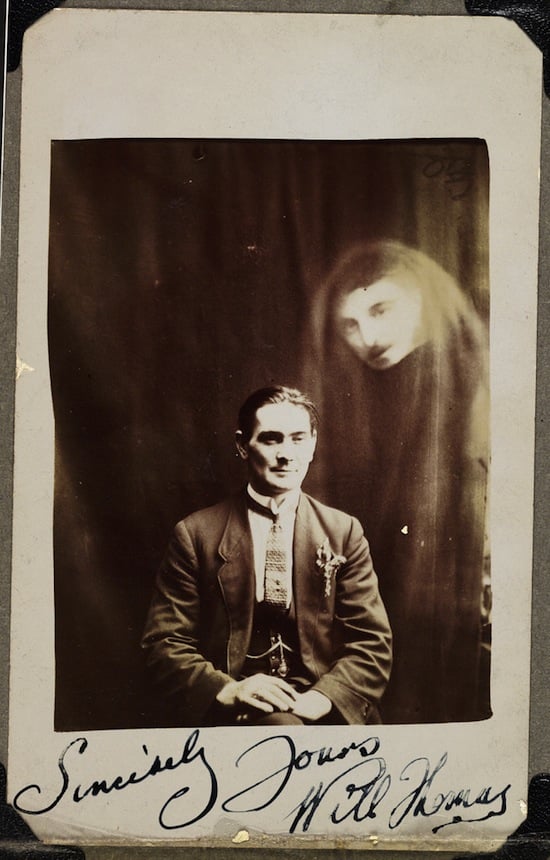
After this the séances were given up but Jacobsen produced an instrument called a planchette and with difficulty persuaded Bickley to try it, which he did after many precautions. The thing, a heart-shaped piece of wood mounted on wheels and with a pencil stuck at its narrow end, cantered about the sheet of paper on which it was placed, Bickley, whose hands rested upon it, staring at the roof of the cabin. Then it began to scribble and after a while stopped still.
“Will the Doctor look?” said Jacobsen. “Perhaps the spirits have told him something.”
“Oh! curse all this silly talk about spirits,” exclaimed Bickley, as he arranged his eyeglasses and held up the paper to the light, for it was after dinner.
He stared, then with an exclamation which I will not repeat, and a glance of savage suspicion at the poor Dane and the rest of us, threw it down and left the cabin. I picked it up and next moment was screaming with laughter. There on the top of the sheet was a rough but entirely recognizable portrait of Bickley with the accordion on his head, and underneath, written in a delicate, Italian female hand, absolutely different from his own, were these words taken from one of St. Paul’s Epistles —”Oppositions of science falsely so called.” Underneath them again in a scrawling, schoolboy fist, very like Bastin’s, was inscribed, “Tell us how this is done, you silly doctor, who think yourself so clever.”
“It seems that the devil really can quote Scripture,” was Bastin’s only comment, while Jacobsen stared before him and smiled.
Bickley never alluded to the matter, but for days afterwards I saw him experimenting with paper and chemicals, evidently trying to discover a form of invisible ink which would appear upon the application of the hand. As he never said anything about it, I fear that he failed.
This planchette business had a somewhat curious ending. A few nights later Jacobsen was working it and asked me to put a question. To oblige him I inquired on what day we should reach Fremantle, the port of Perth. It wrote an answer which, I may remark, subsequently proved to be quite correct.
“That is not a good question,” said Jacobsen, “since as a sailor I might guess the reply. Try again, Mr. Arbuthnot.”
“Will anything remarkable happen on our voyage to the South Seas?” I inquired casually.
The planchette hesitated a while then wrote rapidly and stopped. Jacobsen took up the paper and began to read the answer aloud —”To A, B the D, and B the C, the most remarkable things will happen that have happened to men living in the world.”
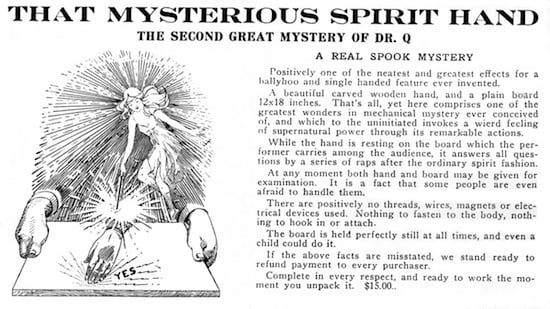
“That must mean me, Bickley the doctor and Bastin the clergyman,” I said, laughing.
Jacobsen paid no attention, for he was reading what followed. As he did so I saw his face turn white and his eyes begin to start from his head. Then suddenly he tore the paper in pieces which he thrust into his pocket. Lifting his great fist he uttered some Danish oath and with a single blow smashed the planchette to fragments, after which he strode away, leaving me astonished and somewhat disturbed. When I met him the next morning I asked him what was on the paper.
“Oh!” he said quietly, “something I should not like you too-proper English gentlemens to see. Something not nice. You understand. Those spirits not always good; they do that kind of thing sometimes. That’s why I broke up this planchette.”
Then he began to talk of something else and there the matter ended.
I should have said that, principally with a view to putting themselves in a position to confute each other, ever since we had started from Marseilles both Bastin and Bickley spent a number of hours each day in assiduous study of the language of the South Sea Islands. It became a kind of competition between them as to which could learn the most. Now Bastin, although simple and even stupid in some ways, was a good scholar, and as I knew at college, had quite a faculty for acquiring languages in which he had taken high marks at examinations. Bickley, too, was an extraordinarily able person with an excellent memory, especially when he was on his mettle. The result was that before we ever reached a South Sea island they had a good working knowledge of the local tongues.
As it chanced, too, at Perth we picked up a Samoan and his wife who, under some of the “white Australia” regulations, were not allowed to remain in the country and offered to work as servants in return for a passage to Apia where we proposed to call some time or other. With these people Bastin and Bickley talked all day long till really they became fairly proficient in their soft and beautiful dialect. They wished me to learn also, but I said that with two such excellent interpreters and the natives while they remained with us, it seemed quite unnecessary. Still, I picked up a good deal in a quiet way, as much as they did perhaps.
At length, travelling on and on as a voyager to the planet Mars might do, we sighted the low shores of Australia and that same evening were towed, for our coal was quite exhausted, to the wharf at Fremantle. Here we spent a few days exploring the beautiful town of Perth and its neighbourhood where it was very hot just then, and eating peaches and grapes till we made ourselves ill, as a visitor often does who is unaware that fruit should not be taken in quantity in Australia while the sun is high. Then we departed for Melbourne almost before our arrival was generally known, since I did not wish to advertise our presence or the object of our journey.
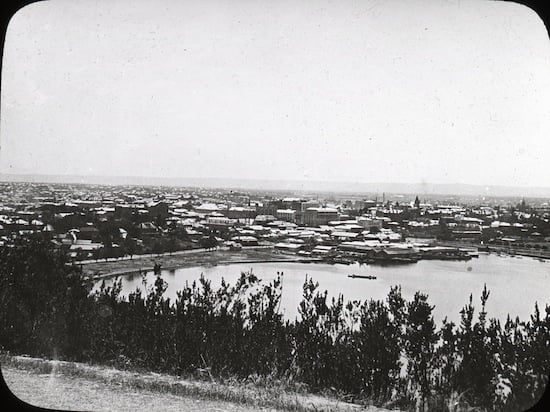
We crossed the Great Australian Bight, of evil reputation, in the most perfect weather; indeed it might have been a mill pond, and after a short stay at Melbourne, went on to Sydney, where we coaled again and laid in supplies.
Then our real journey began. The plan we laid out was to sail to Suva in Fiji, about 1,700 miles away, and after a stay there, on to Hawaii or the Sandwich Islands, stopping perhaps at the Phœnix Islands and the Central Polynesian Sporades, such as Christmas and Fanning Isles. Then we proposed to turn south again through the Marshall Archipelago and the Caroline Islands, and so on to New Guinea and the Coral Sea. Particularly did we wish to visit Easter Island on account of its marvelous sculptures that are supposed to be the relics of a pre-historic race. In truth, however, we had no fixed plan except to go wherever circumstance and chance might take us. Chance, I may add, or something else, took full advantage of its opportunities.
We came to Suva in safety and spent a while in exploring the beautiful Fiji Isles where both Bastin and Bickley made full inquiries about the work of the missionaries, each of them drawing exactly opposite conclusions from the same set of admitted facts. Thence we steamed to Samoa and put our two natives ashore at Apia, where we procured some coal. We did not stay long enough in these islands to investigate them, however, because persons of experience there assured us from certain familiar signs that one of the terrible hurricanes with which they are afflicted, was due to arrive shortly and that we should do well to put ourselves beyond its reach. So having coaled and watered we departed in a hurry.
Up to this time I should state we had met with the most wonderful good fortune in the matter of weather, so good indeed that never on one occasion since we left Marseilles, had we been obliged to put the fiddles on the tables. With the superstition of a sailor Captain Astley, when I alluded to the matter, shook his head saying that doubtless we should pay for it later on, since “luck never goes all the way” and cyclones were reported to be about.
Here I must tell that after we were clear of Apia, it was discovered that the Danish mate who was believed to be in his cabin unwell from something he had eaten, was missing. The question arose whether we should put back to find him, as we supposed that he had made a trip inland and met with an accident, or been otherwise delayed. I was in favour of doing so though the captain, thinking of the threatened hurricane, shook his head and said that Jacobsen was a queer fellow who might just as well have gone overboard as anywhere else, if he thought he heard “the spirits, of whom he was so fond,” calling him. While the matter was still in suspense I happened to go into my own stateroom and there, stuck in the looking-glass, saw an envelope in the Dane’s handwriting addressed to myself. On opening it I found another sealed letter, unaddressed, also a note that ran as follows:
“Honoured Sir,
“You will think very badly of me for leaving you, but the enclosed which I implore you not to open until you have seen the last of the Star of the South, will explain my reason and I hope clear my reputation. I thank you again and again for all your kindness and pray that the Spirits who rule the world may bless and preserve you, also the Doctor and Mr. Bastin.”
This letter, which left the fate of Jacobsen quite unsolved, for it might mean either that he had deserted or drowned himself, I put away with the enclosure in my pocket. Of course there was no obligation on me to refrain from opening the letter, but I shrank from doing so both from some kind of sense of honour and, to tell the truth, for fear of what it might contain. I felt that this would be disagreeable; also, although there was nothing to connect them together, I bethought me of the scene when Jacobsen had smashed the planchette.
On my return to the deck I said nothing whatsoever about the discovery of the letter, but only remarked that on reflection I had changed my mind and agreed with the captain that it would be unwise to attempt to return in order to look for Jacobsen. So the boatswain, a capable individual who had seen better days, was promoted to take his watches and we went on as before. How curiously things come about in the world! For nautical reasons that were explained to me, but which I will not trouble to set down, if indeed I could remember them, I believe that if we had returned to Apia we should have missed the great gale and subsequent cyclone, and with these much else. But it was not so fated.
It was on the fourth day, when we were roughly seven hundred miles or more north of Samoa, that we met the edge of this gale about sundown. The captain put on steam in the hope of pushing through it, but that night we dined for the first time with the fiddles on, and by eleven o’clock it was as much as one could do to stand in the cabin, while the water was washing freely over the deck. Fortunately, however, the wind veered more aft of us, so that by putting about her head a little (seamen must forgive me if I talk of these matters as a landlubber) we ran almost before the wind, though not quite in the direction that we wished to go.
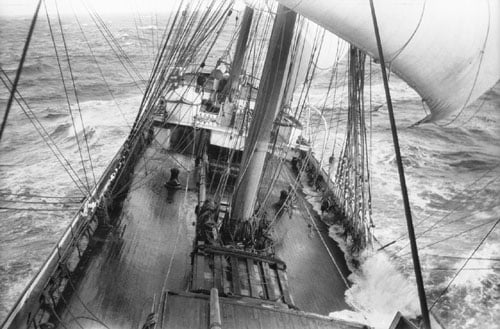
When the light came it was blowing very hard indeed, and the sky was utterly overcast, so that we got no glimpse of the sun, or of the stars on the following night. Unfortunately, there was no moon visible; indeed, if there had been I do not suppose that it would have helped us because of the thick pall of clouds. For quite seventy-two hours we ran on beneath bare poles before that gale. The little vessel behaved splendidly, riding the seas like a duck, but I could see that Captain Astley was growing alarmed. When I said something complimentary to him about the conduct of the Star of the South, he replied that she was forging ahead all right, but the question was — where to? He had been unable to take an observation of any sort since we left Samoa; both his patent logs had been carried away, so that now only the compass remained, and he had not the slightest idea where we were in that great ocean studded with atolls and islands.
I asked him whether we could not steam back to our proper course, but he answered that to do so he would have to travel dead in the eye of the gale, and he doubted whether the engines would stand it. Also there was the question of coal to be considered. However, he had kept the fires going and would do what he could if the weather moderated.
That night during dinner which now consisted of tinned foods and whisky and water, for the seas had got to the galley fire, suddenly the gale dropped, whereat we rejoiced exceedingly. The captain came down into the saloon very white and shaken, I thought, and I asked him to have a nip of whisky to warm him up, and to celebrate our good fortune in having run out of the wind. He took the bottle and, to my alarm, poured out a full half tumbler of spirit, which he swallowed undiluted in two or three gulps.
“That’s better!” he said with a hoarse laugh. “But man, what is it you are saying about having run out of the wind? Look at the glass!”
“We have,” said Bastin, “and it is wonderfully steady. About 29 degrees or a little over, which it has been for the last three days.”
Again Astley laughed in a mirthless fashion, as he answered:
“Oh, that thing! That’s the passengers’ glass. I told the steward to put it out of gear so that you might not be frightened; it is an old trick. Look at this,” and he produced one of the portable variety out of his pocket.
We looked, and it stood somewhere between 27 degrees and 28 degrees.
“That’s the lowest glass I ever saw in the Polynesian or any other seas during thirty years. It’s right, too, for I have tested it by three others,” he said.
“What does it mean?” I asked rather anxiously.
“South Sea cyclone of the worst breed,” he replied. “That cursed Dane knew it was coming and that’s why he left the ship. Pray as you never prayed before,” and again he stretched out his hand towards the whisky bottle. But I stepped between him and it, shaking my head. Thereon he laughed for the third time and left the cabin. Though I saw him once or twice afterwards, these were really the last words of intelligible conversation that I ever had with Captain Astley.
“It seems that we are in some danger,” said Bastin, in an unmoved kind of way. “I think that was a good idea of the captain’s, to put up a petition, I mean, but as Bickley will scarcely care to join in it I will go into the cabin and do so myself.”
Bickley snorted, then said:
“Confound that captain! Why did he play such a trick upon us about the barometer? Humphrey, I believe he had been drinking.”
“So do I,” I said, looking at the whisky bottle. “Otherwise, after taking those precautions to keep us in the dark, he would not have let on like that.”
“Well,” said Bickley, “he can’t get to the liquor, except through this saloon, as it is locked up forward with the other stores.”
“That’s nothing,” I replied, “as doubtless he has a supply of his own; rum, I expect. We must take our chance.”
Bickley nodded, and suggested that we should go on deck to see what was happening. So we went. Not a breath of wind was stirring, and even the sea seemed to be settling down a little. At least, so we judged from the motion, for we could not see either it or the sky; everything was as black as pitch. We heard the sailors, however, engaged in rigging guide ropes fore and aft, and battening down the hatches with extra tarpaulins by the light of lanterns. Also they were putting ropes round the boats and doing something to the spars and topmasts.
Presently Bastin joined us, having, I suppose, finished his devotions.
“Really, it is quite pleasant here,” he said. “One never knows how disagreeable so much wind is until it stops.”
I lit my pipe, making no answer, and the match burned quite steadily there in the open air.
“What is that?” exclaimed Bickley, staring at something which now I saw for the first time. It looked like a line of white approaching through the gloom. With it came a hissing sound, and although there was still no wind, the rigging began to moan mysteriously like a thing in pain. A big drop of water also fell from the sides into my pipe and put it out. Then one of the sailors cried in a hoarse voice:
“Get down below, governors, unless you want to go out to sea!”
“Why?” inquired Bastin.
“Why? Becos the ’urricane is coming, that’s all. Coming as though the devil had kicked it out of ’ell.”
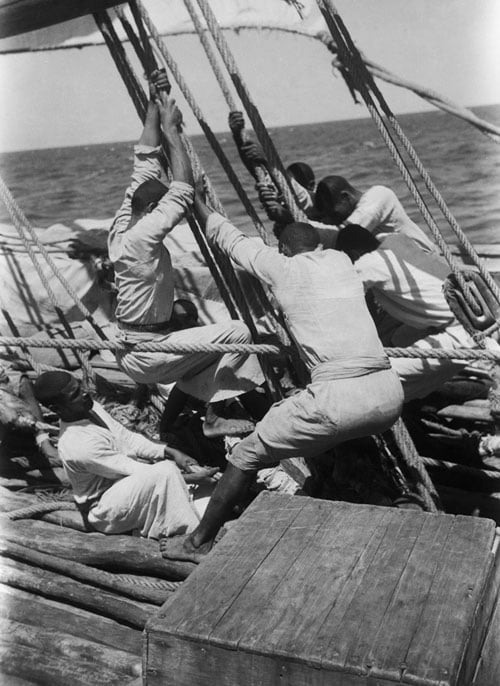
Bastin seemed inclined to remonstrate at this sort of language, but we pushed him down the companion and followed, propelling the spaniel Tommy in front of us. Next moment I heard the sailors battening the hatch with hurried blows, and when this was done to their satisfaction, heard their feet also as they ran into shelter.
Another instant and we were all lying in a heap on the cabin floor with poor Tommy on top of us. The cyclone had struck the ship! Above the wash of water and the screaming of the gale we heard other mysterious sounds, which doubtless were caused by the yards hitting the seas, for the yacht was lying on her side. I thought that all was over, but presently there came a rending, crashing noise. The masts, or one of them, had gone, and by degrees we righted.
“Near thing!” said Bickley. “Good heavens, what’s that?”
I listened, for the electric light had temporarily gone out, owing, I suppose, to the dynamo having stopped for a moment. A most unholy and hollow sound was rising from the cabin floor. It might have been caused by a bullock with its windpipe cut, trying to get its breath and groaning. Then the light came on again and we saw Bastin lying at full length on the carpet.
“He’s broken his neck or something,” I said.
Bickley crept to him and having looked, sang out:
“It’s all right! He’s only sea-sick. I thought it would come to that if he drank so much tea.”
“Sea-sick,” I said faintly —”sea-sick?”
“That’s all,” said Bickley. “The nerves of the stomach acting on the brain or vice-versa — that is, if Bastin has a brain,” he added sotto voce.
“Oh!” groaned the prostrate clergyman. “I wish that I were dead!”
“Don’t trouble about that,” answered Bickley. “I expect you soon will be. Here, drink some whisky, you donkey.”
Bastin sat up and obeyed, out of the bottle, for it was impossible to pour anything into a glass, with results too dreadful to narrate.
“I call that a dirty trick,” he said presently, in a feeble voice, glowering at Bickley.
“I expect I shall have to play you a dirtier before long, for you are a pretty bad case, old fellow.”
As a matter of fact he had, for once Bastin had begun really we thought that he was going to die. Somehow we got him into his cabin, which opened off the saloon, and as he could drink nothing more, Bickley managed to inject morphia or some other compound into him, which made him insensible for a long while.
“He must be in a poor way,” he said, “for the needle went more than a quarter of an inch into him, and he never cried out or stirred. Couldn’t help it in that rolling.”
But now I could hear the engines working, and I think that the bow of the vessel was got head on to the seas, for instead of rolling we pitched, or rather the ship stood first upon one end and then upon the other. This continued for a while until the first burst of the cyclone had gone by. Then suddenly the engines stopped; I suppose that they had broken down, but I never learned, and we seemed to veer about, nearly sinking in the process, and to run before the hurricane at terrific speed.
“I wonder where we are going to?” I said to Bickley. “To the land of sleep, Humphrey, I imagine,” he replied in a more gentle voice than I had often heard him use, adding: “Good-bye, old boy, we have been real friends, haven’t we, notwithstanding my peculiarities? I only wish that I could think that there was anything in Bastin’s views. But I can’t, I can’t. It’s good night for us poor creatures!”
NEXT WEEK: “After consultation Marama answered: ‘We do not want new hearts as the old ones are good, but we wish to be rid of lumps and sicknesses. If you can do this we will make you gods and worship you and give you many wives.’ (Here Bastin held up his hands in horror.) ‘When will you begin to take away the lumps?’ ‘To-morrow,’ said Bickley. ‘But learn that if you try to harm us we will bring another wave which will drown all your country.’ Nobody seemed to doubt our capacities in this direction, but one inquiring spirit in a wicker crate did ask how it came about that if we controlled the ocean we had arrived in half a canoe instead of a whole one.”
RADIUM AGE SCIENCE FICTION: “Radium Age” is HILOBROW’s name for the 1904–33 era, which saw the discovery of radioactivity, the revelation that matter itself is constantly in movement — a fitting metaphor for the first decades of the 20th century, during which old scientific, religious, political, and social certainties were shattered. This era also saw the publication of genre-shattering writing by Edgar Rice Burroughs, Sax Rohmer, E.E. “Doc” Smith, Jack London, Arthur Conan Doyle, Aldous Huxley, Olaf Stapledon, Karel Čapek, H.P. Lovecraft, Charlotte Perkins Gilman, Yevgeny Zamyatin, Philip Gordon Wylie, and other pioneers of post-Verne/Wells, pre-Golden Age “science fiction.” More info here.
HILOBOOKS: The mission of HiLoBooks is to serialize novels on HiLobrow; and also, as of 2012, operating as an imprint of Richard Nash’s Cursor, to reissue Radium Age science fiction in beautiful new print editions. So far, we have published Jack London’s The Scarlet Plague, Rudyard Kipling’s With the Night Mail (and “As Easy as A.B.C.”), Arthur Conan Doyle’s The Poison Belt, H. Rider Haggard’s When the World Shook, Edward Shanks’s The People of the Ruins, William Hope Hodgson’s The Night Land, and J.D. Beresford’s Goslings. Forthcoming: E.V. Odle’s The Clockwork Man, Cicely Hamilton’s Theodore Savage, and Muriel Jaeger’s The Man with Six Senses. For more information, visit the HiLoBooks homepage.
READ: You are reading H. Rider Haggard’s When The World Shook. Also read our serialization of: Jack London’s The Scarlet Plague | Rudyard Kipling’s With the Night Mail and “As Easy As A.B.C.”
ORIGINAL FICTION: HILOBROW has serialized three novels: James Parker’s The Ballad of Cocky The Fox (“a proof-of-concept that serialization can work on the Internet” — The Atlantic) and Karinne Keithley Syers’s Linda Linda Linda. We also publish original stories and comics.
